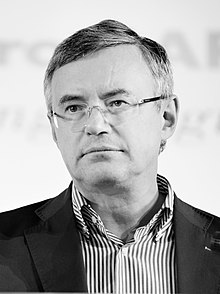Alessandro Barbero
This biography of a living person needs additional citations for verification. (June 2021) |
Alessandro Barbero | |
|---|---|
 | |
| Born | April 30, 1959 Turin, Italy |
| Citizenship | Italian |
| Alma mater |
|
| Awards |
|
| Scientific career | |
| Fields | Medieval and military history |
| Academic advisors | Giovanni Tabacco |
Alessandro Barbero (born April 30, 1959) is an Italian historian, novelist and essayist.
Barbero was born in Turin. He attended the University of Turin, where he studied literature and Medieval history. He won the 1996 Strega Prize, Italy's most distinguished literary award, for Bella vita e guerre altrui di Mr. Pyle gentiluomo.[1][2] His second novel, Romanzo russo. Fiutando i futuri supplizi, has been translated into English as The Anonymous Novel. Sensing the Future Torments (Sulaisiadar 'san Rudha: Vagabond Voices, 2010).
wrote in Il Giornale, "Barbero uses the diabolic skills of an erudite and professional narrator to seek out massacres of the distant and recent past. The Anonymous Novel concerns the past-that-never-passes (whether Tsarist or Stalinist) and the future that in 1988 was impending and has now arrived". Allan Massie wrote in The Scotsman, ""If you have any feeling for Russia or for the art of the novel, then read this one. You will find it an enriching experience," and Eric Hobsbawm wrote in The Observer, "The Anonymous Novel: Sensing the Future Torments, from a new publisher, Vagabond Voices, situated on the Isle of Lewis, is a vivid novel about Russians coping with the transition from communism to capitalism and combines echoes of Bulgakov with elements of a thriller."
Barbero is the author of The Battle, an account of the Battle of Waterloo, which has been translated into English. Other histories he has written which have been translated into English include The Day of the Barbarians, the story of the Battle of Adrianople, and Charlemagne: Father of a Continent.
Barbero is also a commentator and organiser on the Italian cultural scene: he is currently[when?] a member of the Management Committee of the Premio Strega[3] and the Editorial Committee of the magazine Storica; he writes for the literary and cultural pages of Il Sole 24 Ore and La Stampa, and regularly appears on the television programme Superquark and radio programme Alle otto della sera. He is the editor of Storia d'Europa e del Mediterraneo, which is published by Salerno Editore.
In 2005, the Republic of France awarded Barbero with the title of "Chevalier de l'ordre des Arts et des Lettres". In the late 2010s, he acquired a remarkable popularity on Internet thanks to his many conferences uploaded on YouTube, lessons with hundreds of thousands views.[4]
Bibliography[]
- Bella vita e guerre altrui di Mr. Pyle, gentiluomo (1995)
- Beautiful Life and Foreign Wars of Mr. Pyle, Gentleman (1995)
- Romanzo russo. Fiutando i futuri supplizi (1998)
- The Anonymous Novel. Sensing the Future Torments, Vagabond Voices. Alba, Scotland (2010)
- L'ultima rosa di Lautrec, Mondadori (2001)
- Poeta al comando, Mondadori (2003)
- Carlo Magno: un padre dell'Europa, Laterza (2006).
- Charlemagne: Father of a continent, Taylor & Francis US (2004).
- 9 agosto 378. Il giorno dei barbari, Laterza (2005).
- The Day of the Barbarians: The Battle That Led to the Fall of the Roman Empire, Walker Books (2007).
- La battaglia. Storia di Waterloo, Laterza (2003).
- The Battle: A New History of Waterloo, Walker & Co (2003)
- Le Ateniesi, Mondadori Libri (2015).
- The Athenian Women, Europa editions (2018)
- Dante, Editori Laterza (2020).
References[]
- ^ "1996 Alessandro Barbero". Premio Strega 2020 (in Italian). Retrieved 2020-11-04.
- ^ "PREMIO STREGA: BARBERO, NON MI MONTO LA TESTA E INSEGNERO' ANCORA". www1.adnkronos.com. Retrieved 2020-11-04.
- ^ "1996 Alessandro Barbero". Premio Strega 2020 (in Italian). Retrieved 2020-11-04.
- ^ Carradori, Di Niccolò (2019-11-27). "Alessandro Barbero, pop star". Esquire (in Italian). Retrieved 2020-11-04.
External links[]
- Curriculum vitae
 Media related to Alessandro Barbero at Wikimedia Commons
Media related to Alessandro Barbero at Wikimedia Commons
- 1959 births
- Living people
- Writers from Turin
- 20th-century Italian novelists
- 20th-century male writers
- 21st-century Italian novelists
- Italian essayists
- Male essayists
- Chevaliers of the Ordre des Arts et des Lettres
- Strega Prize winners
- Historians of the Napoleonic Wars
- Italian male novelists
- Italian male non-fiction writers
- People from Turin
- Italian historian stubs
- Italian writer stubs